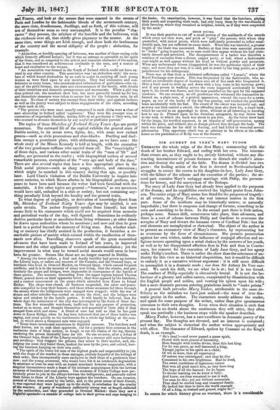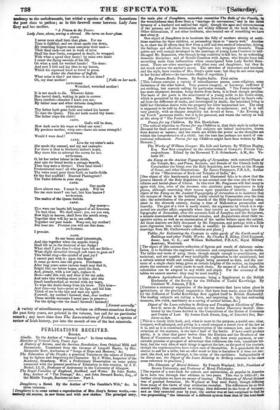SIR AUBREY DE VERB'S MARY TUDOR EMBRACES the whole reign
of the first Mary; commencing with the death of her brother Edward, and ending with her own. The interme- diate events are, as they ought to be, strictly historical, without any dis- tracting intermixture of private fortunes to disturb the reader's atten- tion and destroy the unity of the fable. The drama is divided into two parts : the leading action of the first is devoted to Northumberland's struggles to secure the crown to his daughter-in-law, Lady Jane Grey, with the failure of the scheme and the execution of the parties ; the se- cond part contains Mary's unhappy marriage with Philip, the persecu- tions for heresy, and the martyrdom of the Bishops.
The story of Lady Jane Grey had already been applied to the purposes of the drama ; and its capabilities received the highest praise from John- son. The entire reign of Mary seems less fitted for the purposes of tragedy: at all events, in Mary Tudor, the real interest centres in the first part. Some of the incidents may be historically untrue, or naturally improbable ; but there is suspense and change of fortune, something to be seen and something to be done. In the second part there is little action, perhaps none. Scenes shift, occurrences take place, time advances, and there is a sort of scheme between Philip and Gardiner to overcome the scruples of Mary and thwart the humane views of Cardinal Pole : but the real elements are metaphysical or rhetorical. The object of the author is to present an excusatory view of Mary's eharacter, by representing her as overcome by the force of circumstances. She permits persecution against her own wishes, under the influence of conjugal affection and re- ligious terrors operating upon a mind shaken by the sorrowi of her youth, as well as by her disappointed affection first in Pole and then in Conde- naye, her remorse for the execution of Lady Jane Grey, and her agony under Philip's conduct. There is rather the show than the substance of au- thority for this view as an historical disquisition, but it would be difficult to embody it as a narrative without argument : it is still more difficult to accomplish it in a dramatic mode ; nor does Sir Aubrey De Vere suc- ceed. We catch his drift, we see what he is at ; but it is too forced. The conduct of Philip especially is obtrusively brutal. It is not the be- haviour of a gloomy and sullen nature, exasperated by dissatisfaction with the English people and nobles, and venting his spleen upon his wife; but a mere dramatis persona uttering gratuitous insult to "make points." A general fault pervades Mary Tudor, attributable to the same de- ficiency as the mistakes we have just noticed—the want of true dra- matic genius in the author. The characters mostly address the reader, and speak for some purpose of the writer, rather than give spontaneous utterance to their own thoughts. Even when their situation is such that there can be no doubt about the sentiments they will utter, they often speak too poetically ; the business stops while the speaker describes. Mary Tudor, however, has a rare excellence in dramatic poetry of the present day. The thoughts are elevated, and an interest is sustained; and when the subject is rhetorical the author writes appropriately and with effect. The character of Edward, spoken by Cranmer on the King's death, is an example. "He's dead !—and never passed a purer spirit,
Stored with more graces of humanity, More fraught with truths divine, than this lost king.
For he was grave, as well beseemed a king,
Though joyous in his spirit as a child; Of wit so keen, that all expectancy Of nature was outstripped: and thus he dies Consumed in his own brightness. Had he lived, The sweet conditions of ingenuous nature Had won all good men's love, as they have long The hope of all the learned: for he began To favour learning ere he knew it fully; And knew, ere time remained to use it well. Too soon he dies; yet not without memorials
That shall be storied long and treasured fondly. He lacked but time to leave the world example
Of all a king, so trained and graced, might be!"
In scenes for which history gives no warrant, there is a considerable
"A Prison in the Tower.
Lady Jane, alone, sewing a shroud. She turas an hour-glass.
JANE.
I never more shall turn that glass. For me Time is fulfilled; and ere those sands run down, My trembling fingers must complete their task— Their final task—or not in work of mine Shall his dear limbs, composed in death, be wrapped. With what a speed they haste! by mine own heart I count the flying seconds of his life.
Oh what a task for wedded hands! 'Tis done: And now I fold and lay thee to my bosom, Which his espoused head so loved to press. Enter the Dutchess of Suffolk. What noise is that? not time—it is not time?
Oh, my dear mother! [Falls on her neck.
DUTCHER&
Wretched, wretched mother!
JANE.
It is not much to die. Whoever faints Has tasted death, waking in pain to sorrow. Have comfort--.desolate I leave you not: My father near and other duteous daughters.
DUTCHESS.
Thy father bath gone forth and raised his banner
To dare the Queen. Thia act .hath sealed thy doom: The father slays his child!
JANE.
God's will be done, How dark soe'er his ways or blind our eyes! My precious mother, weep not—leave me some strength !
DUTCEIESS.
Would I were dead!
JANE.
Live for my sister's sake.
She needs thy counsel, and my sad example: For there is that in Herbert's father's heart, May move him to attempt the crown for her.
DUTCHESS.
0, let her rather labour in the fields,
And spin for bread beside a cottage-hearth, Than step unto a throne! Thou fatal blood! Predestinated mee! all who partake Thy veins must pour them forth on battle-fields Or the foul scaffold ! Doomed Plantagenet!. The Tudor follows in your steps.
JANE..
Our sands Have almost ran. I must be quick. Will he See me once more? one last, last kiss bestow?
T)UTCHESS.
The malice of the Queen forbids.
JANE.
Say mercy— Else were our hearts left beggared of all firmness. Tis best thus. We shall meet: yes, ere you sun, Now high in heaven, shall from the zenith stoop, Together they will lay us in one coffin, Together our poor heads. Weep not, my mother! But hear me. Promise you will see this done.
DUTCI1ESS.
I promise.
JANE.
So our bones shall intermingle, And rise together when the angelic tramp Shall lift us to the footstool of our Judge!
What shall I givethee?—they have left me little—
What slight memorial through soft tears to gaze on? This bridal ring—the symbol of past joy? I cannot part with it: upon this finger It must go down into the grave. Perchance After long years some curious hand may find it, Bright like our better hopes, amid the dust,
And, piously, with a low sigh, replace it.
Here—take this veil, and wear it for my sake. And take this winding-sheet to him; and this Small handkerchief so wetted with my tears,
To wipe the death-damp from his brow. This kiss—
And this—my last—print on his lips, and bid him Think of me to the last and wait my spirit. Farewell, my mother! farewell, dear, dear mother!
i
These terrible moments I must pass n prayer—
For the dying—for the dead! farewell! farewell!
[Exeunt severally."
A variety of miscellaneous poems, written on different occasions during the past forty years, are printed in the volume, but call for no particular remark ; any more than does The .Larnent Wittig of Ireland, a species of review af Irish history, put into the mouth of one of the last minstrels. tendency to the melodramatic, but withal a species of effect. Sometimes the poet rises to pathos ; as in this farewell scene between Lady Jane Grey and her mother.



























 Previous page
Previous page